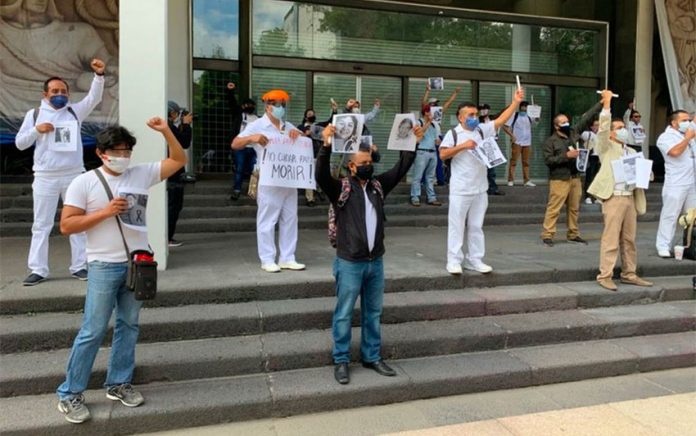The public health system is woefully unprepared to deal with the coronavirus pandemic, says the bureau chief of Bloomberg News in Mexico.
In an article published on Friday, Nacha Cattan, originally of New York, writes that in the 15 years she has lived in Mexico she has “witnessed first hand what a truly crumbling public health care system looks like” and “it’s terrifying.”
Public hospitals in Mexico have a shortage of basic equipment, medication and personnel and some don’t even have soap, Cattan said.
She recounted the harrowing public hospital experiences of her husband’s grandmother and cousin, both of whom died.
Cattan wrote that “long before the coronavirus raced around the globe,” her husband’s 84-year-old grandmother spent a month in intensive care in a Mexico City public hospital after her lungs filled with water.
She acknowledged that she may have died even if she had received proper treatment but noted that “there was nothing proper about” the care she did receive.
Cattan said that her husband’s grandmother, Nina, was intubated but drifted in and out of consciousness because, as a nurse admitted, the hospital didn’t have enough medications to keep her sedated.
She wrote that Nina periodically experienced “violent spasms” because she wasn’t properly sedated while hooked up to a ventilator. When she needed a tracheotomy, the family had to track down and buy a tube at a medical supply store themselves, Cattan said.
She also wrote that when the hospital’s electricity went off one day, doctors gave Nina’s daughter a hand pump so that she could manually respirate her mother.
Whereas nightmare medical stories are the exception rather than the norm in the United States and Europe, improper and substandard medical treatment is commonplace in Mexico, Cattan said.
“I know there are plenty of medical horror stories in the U.S. and Europe. But – at least in pre-Covid times – such tales have elicited gasps and outrage because they were the outliers in systems that more or less functioned as they should. Here, in Mexico, the stories that cause eyes to pop are the ones where nothing goes wrong,” she wrote.
“In the current crisis, mistaken diagnoses and pure neglect are reaching new heights.”
Cattan also cited the experience of her husband’s cousin, Salvador, a diabetic who fainted while returning to Mexico on a flight from the United States.
She said that Salvador needed hemodialysis to filter waste from his blood but the public hospital to which he was taken upon arrival in Mexico didn’t have the required equipment.
“For three days, we tried to transfer him to a facility that did. The red tape was debilitating. When he was finally moved, he died less than two hours later,” Cattan wrote.
Her article noted that there are just 1.4 hospital beds per 1,000 people in Mexico, the lowest rate among OECD countries, and that the government spent only 5.5% of GDP on health in 2017, the most recent year for which World Bank data is available.
Guatemala, El Salvador and Haiti – the poorest country in the western hemisphere – all spent a higher percentage of GDP on health in the same year.
Amid the coronavirus crisis, the lack of investment in the public health system has come into sharp focus as medical personnel protest because of a shortage of basic yet essential equipment such as masks and gloves.
More than 20,000 health workers have been infected with the coronavirus, according to Health Ministry data presented this week, and 10,000 more are suspected of having Covid-19. Almost 300 doctors, nurses and other medical personnel have died after testing positive.
In that context, Mexican Social Security Institute (IMSS) health workers protested on Friday morning outside IMSS headquarters in Mexico City.
Holding candles and photographs of their deceased colleagues, the workers said that there is still a shortage of personal protective equipment in IMSS hospitals.
“We want to live to take care [of patients], not take care [of patients] to die,” said one nurse, according to the newspaper Reforma.
More than 100 IMSS health workers have died due to Covid-19, the protesters said. They also said that IMSS has refused to allow some health workers to be tested for Covid-19 despite having been exposed to coronavirus patients.
The protesters said they would submit a petition to the federal Health Ministry that sets out the demands of public health workers. A national protest is being organized for July 1, they said.
Just over three months after Covid-19 was first detected in Mexico, the disease has claimed 12,545 lives in Mexico, according to official figures, but the real death toll is believed to be much higher.
More than 105,000 people are confirmed to have been infected but as testing rates are low, the real size of the pandemic is undoubtedly much bigger.
Deputy Health Minister Hugo López-Gatell, Mexico’s coronavirus czar, said Thursday that as many as 60,000 Covid-19 patients could die in a worst case scenario, while a model developed by a Massachusetts Institute of Technology-trained data scientist is currently predicting that there will be 92,497 deaths by September 1, a forecast that is down from almost 137,000 a week ago.
